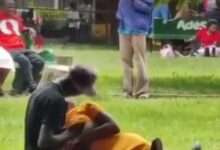British Court Overturns Vybz Kartel's Murder Conviction
Adidja Palmer had initially been convicted and sentenced to life for the 2011 murder of Clive Williams, known as Lizard

British Court Overturns Vybz Kartel's Murder Conviction
The murder conviction of the dancehall artist Vybz Kartel and three co-defendants was overturned on Thursday by the highest court of appeal for Jamaica and other Commonwealth countries.
Vybz Kartel, born Adidja Palmer, had previously been convicted and given a life sentence for the 2011 murder of Clive Williams, known as Lizard.
The sentence was later reduced to 32 and a half years.
On Thursday, the Judicial Committee of the Privy Council in London overturned the conviction because of allegations of jury misconduct in the 2014 trial.
A juror, described in court documents as “Juror X,” was allowed to remain seated after a claim that the person had attempted to bribe other members of the jury.
Jurors ultimately convicted Mr. Palmer, Shawn Campbell, Kahira Jones and André St. John of murder. The court ruled:
Allowing Juror X to remain on the jury is fatal to the safety of the convictions which followed.
It was an infringement of the appellants’ fundamental right to a fair hearing under the Jamaican Constitution.
Also Read: Soul Jah Love Having Mental Challenges, Detained At Yadah Hotel To Recover
Another appeals court will now decide whether Mr. Palmer should be retried.
British Court Overturns Vybz Kartel's Murder Conviction
Lawyers for Mr. Palmer and for the prosecution did not immediately respond to requests for comment.
After a string of successful singles in his native Jamaica, Mr. Palmer reached U.S. charts in 2009 with “Romping Shop,” which also featured Spice, and collaborated with Rihanna, Jay-Z and other artists.
He also starred in the reality TV show “Teacha’s Pet,” which aired on Jamaican TV in 2011.
While imprisoned, Mr. Palmer continued to release new songs, including the 2016 single “Fever,” which went gold.
During the trial, prosecutors alleged that Mr. Williams and another man had been given two unlicensed firearms belonging to Mr. Palmer.
When the pair did not return the weapons on time, they were summoned to Mr. Palmer’s house, where Mr. Williams was killed, according to prosecutors, who relied on evidence from Mr. Palmer’s cellphone to advance their case.
Mr. Williams’s body was never found. All four defendants had pleaded not guilty.

























